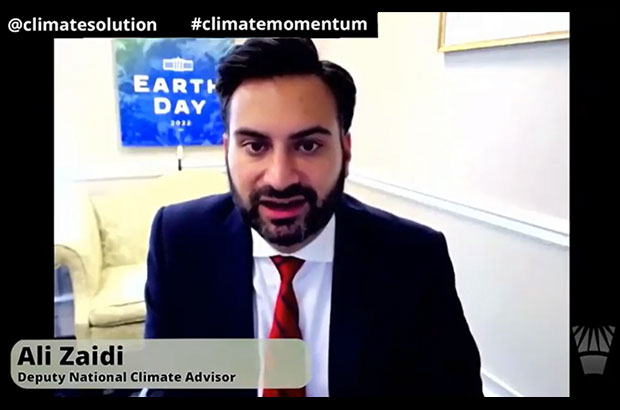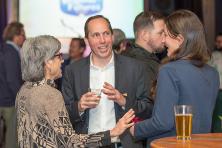Wow, I still cannot believe the lineup of inspiring leaders who joined us for our May 2022 online event, Momentum: Embarking on a new era of climate leadership. I’m happy to be able to share some highlights below.
U.S. Representative Pramila Jayapal
After a thoughtful greeting from our Board President Jackie Dingfelder and WA Communications Manager Stephanie Noren, Congresswoman Pramila Jayapal joined our Executive Director Gregg Small in conversation. Rep. Jayapal sees climate change as the ultimate intersectional issue; she spoke about how to build bridges for a true just transition and how to communicate to others on climate. She described some of her priorities for climate in Congress, what to do with the federal investment dollars coming to our region, and how she stays inspired through the challenges of these times.
“I take my solace from great organizing movements of the past, and leaders from the past, who get their strength in times of crisis,” she said. “These are moments, opportunities, to refuse to give up at whatever barriers we face… Let's just remember as organizers: strength comes in moments of crisis; we are growing our progressive movement for climate justice."
Deputy National Climate Advisor Ali Zaidi
It was a special treat to next hear from Deputy National Climate Advisor Ali Zaidi, based in the White House. Climate Solutions board member Gaurab Bansal previously worked with Zaidi in the Obama administration, and said that he “embodies the type of leader you want in the hardest roles of government service.” Deputy Advisor Zaidi immediately zeroed in on the theme of our event as a theme for how to approach meeting the climate crisis:
“The equation that defines momentum is mass times velocity,” he said. “As we think about what it means to really grow the momentum here, we need to think about it in the same way. How do we broaden the number of folks coming with us for the journey? If we travel alone, we will not meet the moment. And how do we accelerate the pace of progress?”
Like Rep. Jayapal, Zaidi urged us to understand climate action as wholly intersectional: “This is our opportunity if we do it right: to help people move into the middle class, to reach communities that are so often left out and left behind, places that have suffered under the oppression of legacy pollution and cumulative impacts. In everything we do, we string in a focus on high-road and good jobs; a focus on environmental and climate justice; a focus on resilience of communities and regional economic development.”
Climate Solutions Deputy Director Savitha Reddy Pathi
Our Deputy Director Savitha Reddy Pathi reported on Climate Solutions’ recent accomplishments, and how we are facing challenges ahead with a refined strategic focus. “We know that historic pollution is in our atmosphere, and that greater impacts in the coming years are all but inevitable. Even if we don’t look up, the science and trends are overwhelming,” she acknowledged, concluding that “what stands in our way is the status quo… Overcoming this is the decisive work of our decade.”
Ash Awad, Patience Malaba and Deepa Sivarajan on clean buildings
Our Momentum event concluded with an all-star panel on the challenge of getting climate pollution out of our buildings while simultaneously addressing racial and economic injustices. Ash Awad (President and Chief Market Officer with McKinstry as well as a Climate Solutions Board Member) led the discussion with Patience Malaba, Executive Director of the Housing Development Consortium, and Deepa Sivarajan, Climate Solutions’ Washington Clean Buildings Policy Manager. (Donnel Baird of BlocPower, scheduled to participate, was unfortunately unable to make it).
Why the focus on buildings? It’s one of the fastest-growing sources of carbon emissions, yet it’s also among the toughest sectors of our economy to clean up, making it essential to address.
Ash began the discussion by noting that buildings account for about 40% of the global carbon emissions. According to a 2020 U.N. report, we need to be at about half of that level of pollution from that sector in less than ten years to get to where we need to be to achieve climate stability. "We have these three overlapping crises that amplify one another,” Ash concluded. “We clearly have a climate crisis; we have an equity crisis; and we have an affordability crisis. We're not going to be able to solve for one without addressing all... the work that we have at hand isn't just about taking carbon out of the built environment; we've got to be able to do it in a just way."
Patience and Deepa described some of what we are learning about the dangers of burning fossil fuels in buildings, and some nuts and bolts of what ‘decarbonizing the built environment’ means, and praised a recent notable victory in Washington State.
“It’s precisely because of the increased need [for affordable housing] that we need to be at the table supporting that new affordable, multi-family housing being built includes really resilient homes for a sustainable future,” said Patience. “We want to make sure we’re reducing pollution, reducing the ongoing energy cost for low income housing, and also addressing the near-term and long-term effects of climate change.”
Looking ahead, Deepa said that “the next big challenge is going to be our existing buildings, which is the majority of buildings that we have. One of Climate Solutions' top priorities is going to be to advocate to the state legislature for a program that directs money to low income communities to retrofit existing low-income housing.”
Inspired
We were so inspired by our entire event and it would not have been possible if not for all the help in front of and behind the cameras. I want to again thank all of the speakers, event producer Edward Wolcher, and the entire communications and development teams. And of course, to our sponsors (see below!), event hosts and captains, and all of our supporters–this was made possible by your support!
In the words of Deputy Advisor Zaidi, we are truly “building momentum behind the climate solutions we need in this moment of crisis.”






